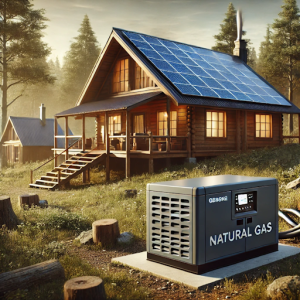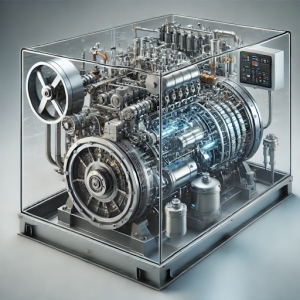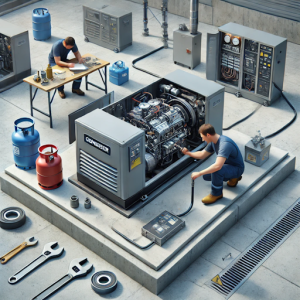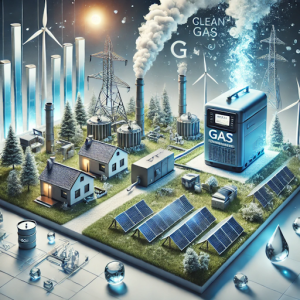Discover the Transformative Benefits of Natural Gas Generators for Sustainable Off-Grid Living
Natural gas generators emerge as an exceptional choice for those in need of a dependable energy source for homes or cabins situated in remote locations. Grasping the various methods of power generation is essential for embarking on a successful off-grid journey. The unique advantages offered by natural gas generators, such as their reliability, cost-effectiveness, and environmentally friendly features, make them an appealing option for individuals passionate about off-grid living and dedicated to sustainability and efficiency. By incorporating this renewable energy solution into your lifestyle, you can achieve a balance of comfort and ecological responsibility.
As the world becomes increasingly reliant on technology, the allure of off-grid living continues to grow. Driven by the pursuit of sustainability, autonomy, or simply a desire for self-sufficiency, disconnecting from traditional power sources can be immensely rewarding. Embracing off-grid power solutions allows you to harness energy derived from renewable resources or alternative fuels, creating a comfortable living experience free from the constraints of conventional electricity systems.
By equipping yourself with the essential knowledge and preparation, you can effortlessly incorporate a natural gas generator into your off-grid lifestyle, guaranteeing that your fundamental needs are consistently met with a reliable energy supply. This article will delve into the myriad advantages of natural gas generators, clarify their operational mechanics, and highlight critical elements to consider when selecting and installing them in your off-grid setup.
 Essential Insights for Optimizing Your Off-Grid Power Solutions
Essential Insights for Optimizing Your Off-Grid Power Solutions
- Off-grid power solutions empower you to liberate yourself from traditional energy resources, making them crucial for remote living or during unanticipated power outages.
- Natural gas generators deliver reliable and efficient energy production, boasting significantly lower emissions compared to diesel or gasoline alternatives.
- These generators function by combusting natural gas to generate mechanical energy, which is converted into electrical energy via a generator system.
- When selecting a natural gas generator, it is essential to assess factors such as power output, fuel efficiency, and maintenance requirements to ensure optimal performance.
- Proper installation and routine maintenance are vital for the efficient and safe operation of your natural gas generator.
Uncover the Remarkable Advantages of Natural Gas Generators for Energy Independence
A standout feature of natural gas generators is their remarkable reliability. By choosing a natural gas generator to meet your off-grid energy needs, you can depend on a consistent power supply tailored to your specific requirements. Unlike solar panels or wind turbines that can be significantly impacted by weather conditions, natural gas generators provide stable energy output that remains unaffected by external factors. This reliability is especially crucial for individuals relying on electricity for essential functions such as heating, refrigeration, and medical equipment, offering peace of mind knowing that power is available when needed most.
In addition to their dependability, natural gas generators also offer considerable cost savings. While the initial investment may be greater than some alternative off-grid options, the long-term savings can be significant. Natural gas is generally more affordable than gasoline or diesel, resulting in lower operational costs over time. Furthermore, maintenance needs for natural gas generators are typically less demanding compared to other generator types, allowing you to conserve both time and resources while enjoying a consistent energy supply.
 Understanding the Operational Mechanics of Natural Gas Generators
Understanding the Operational Mechanics of Natural Gas Generators
Natural gas generators function by converting the chemical energy stored in natural gas into electrical energy through a combustion process. Upon starting the generator, natural gas combines with air and ignites within the engine's combustion chamber. This ignition generates high-pressure gases that propel the engine's pistons, ultimately rotating the generator's rotor and producing electricity. This operational method is noteworthy for its efficiency and cleaner performance compared to other fossil fuel options. A key component of a natural gas generator is its fuel system, which typically features a regulator that controls the gas flow to optimize performance. Modern natural gas generators come equipped with advanced features such as automatic start/stop functions and remote monitoring capabilities, greatly enhancing user convenience.
These innovations allow you to manage your energy supply more effectively, simplifying your off-grid lifestyle while ensuring that your power needs are consistently met.
Key Considerations for Selecting the Right Natural Gas Generator
| Consideration | Description |
|---|---|
| Power Output | Determine the generator's required power output based on the appliances and equipment you intend to operate. |
| Fuel Type | Consider natural gas as your fuel choice due to its clean-burning and cost-effective characteristics. |
| Size and Portability | Select a generator size and portability that align with your available space and mobility requirements. |
| Noise Level | Assess the generator's noise output to ensure it meets acceptable standards for your living environment. |
| Start-up Mechanism | Decide between manual or automatic start-up options based on your convenience and frequency of use. |
When selecting a natural gas generator for your off-grid setup, several important factors must be considered. First and foremost, evaluate your power requirements. Calculate the total wattage necessary to support your essential appliances and devices, ensuring that your chosen generator can handle the load effectively. It is wise to opt for a generator with a slightly higher capacity than your calculated needs to accommodate any sudden increases in power demand.
Another vital consideration is the generator's portability and installation requirements. If you plan to move your generator frequently or use it in multiple locations, seek a lightweight and easily transportable model. Additionally, consider whether you prefer a stationary setup or a portable unit that can be conveniently positioned based on your energy needs. Lastly, pay attention to the generator's noise level; quieter models can substantially enhance your off-grid experience by minimizing disturbances and maintaining the peacefulness of your natural surroundings.
 Best Practices for Effective Installation and Maintenance of Natural Gas Generators
Best Practices for Effective Installation and Maintenance of Natural Gas Generators
Installing a natural gas generator requires meticulous planning and execution to ensure both safety and efficiency. Begin by choosing an appropriate location for your generator, ensuring it complies with local regulations and safety standards. This site should ideally be well-ventilated and sufficiently distanced from flammable materials. You may also need to create a concrete pad or platform to stabilize and protect the generator from moisture damage.
Once the ideal location is established, connect the generator to your natural gas supply line. If you lack experience with gas line installations, it is prudent to seek professional assistance to ensure compliance with all safety protocols. After establishing the fuel connection, set up the necessary electrical connections to integrate the generator with your home’s electrical system. Routine maintenance is essential to ensure your generator operates smoothly over time. This includes regular checks of oil levels, air filter replacements, and spark plug inspections to maintain peak performance and longevity.
Cost Analysis: Comparing Natural Gas Generators with Other Off-Grid Power Solutions
When assessing the costs associated with off-grid energy solutions, it is crucial to conduct a comprehensive comparison between natural gas generators and alternative options such as solar panels and diesel generators. While solar energy systems have gained recognition for their renewable nature, they often require a substantial initial investment in panels, batteries, and inverters. Moreover, solar systems may struggle to deliver adequate power during cloudy days or at night without sufficient battery storage.
On the other hand, diesel generators are known for their reliability; however, they come with higher fuel costs and more frequent maintenance needs than natural gas generators. Given that diesel fuel prices can fluctuate significantly, natural gas often provides a more stable and typically lower-cost option across numerous regions. A long-term cost assessment reveals that natural gas generators generally present a more economical solution for those pursuing off-grid living while maintaining sustainable energy practices.
 Assessing the Environmental Impact of Natural Gas Generators in Off-Grid Living
Assessing the Environmental Impact of Natural Gas Generators in Off-Grid Living
As you evaluate your off-grid energy options, it is essential to consider their environmental impact. Natural gas is frequently touted as a cleaner alternative to other fossil fuels, such as coal or oil, due to its reduced carbon emissions during combustion. By choosing a natural gas generator, you can significantly lower your carbon footprint while enjoying reliable power for your off-grid lifestyle. However, it is vital to recognize that natural gas remains a fossil fuel, and its extraction can result in environmental challenges. Methane leaks during the extraction and transportation processes are considerable contributors to greenhouse gas emissions.
To address these issues, prioritize sourcing natural gas from reputable suppliers who are committed to sustainable practices. Furthermore, incorporating renewable energy sources alongside your natural gas generator can further showcase your dedication to environmental sustainability and responsible energy consumption, creating a well-rounded energy strategy.
Inspiring Real-Life Success Stories: Natural Gas Generators in Off-Grid Power Solutions
Examining real-world examples can provide valuable insights into how natural gas generators have been effectively utilized in off-grid living scenarios. For example, numerous rural homeowners have transitioned to natural gas generators as their primary energy source after facing frequent outages from traditional utility services. The implementation of these generators has empowered them to achieve energy independence while ensuring consistent electricity for heating, cooling, and essential appliances. Another compelling case study involves remote cabins that depend on natural gas generators for seasonal use. Given their isolated locations, these cabins often lack access to conventional power sources; natural gas generators enable cabin owners to enjoy modern conveniences like refrigeration and lighting without compromising their connection to the natural environment.
These success stories illustrate how natural gas generators can effectively support off-grid living, providing comfort and reliability. As you embark on your journey toward off-grid living, consider the extensive benefits that natural gas generators offer. From their reliability and cost-effectiveness to their relatively low environmental impact, these generators can play a crucial role in achieving energy independence. By carefully selecting the appropriate model for your needs and adhering to proper installation and maintenance procedures, you can transition smoothly into an off-grid lifestyle powered by natural gas.
Addressing Frequently Asked Questions About Natural Gas Generators
What constitutes a natural gas generator for off-grid applications?
A natural gas generator designed for off-grid living is a power generation system that utilizes natural gas as its fuel source to produce electricity in remote locations where access to the main power grid is limited or unavailable. This enables users to maintain a sustainable energy supply.
How does a natural gas generator operate in off-grid scenarios?
A natural gas generator tailored for off-grid applications functions by combusting natural gas within an internal combustion engine. This combustion process generates mechanical energy, which is subsequently converted into electrical energy through a generator. The resulting electricity can power various appliances, equipment, and lighting in off-grid settings, ensuring that your needs are met efficiently.
What are the primary benefits of using a natural gas generator for off-grid living?
Key advantages of utilizing a natural gas generator for off-grid living include:
– Lower fuel costs compared to diesel or gasoline generators
– Cleaner combustion resulting in reduced emissions, contributing to a healthier environment
– Continuous fuel supply sourced from natural gas pipelines, ensuring reliability
– Reduced maintenance requirements relative to other fuel types, which saves time and resources
What factors should be considered when utilizing a natural gas generator for off-grid living?
Important considerations when using a natural gas generator in off-grid scenarios include:
– Availability of natural gas supply in your area, which affects feasibility
– Initial installation and equipment costs that may impact your budget
– Regular maintenance and servicing needs to ensure long-term operation
– Environmental implications and compliance with emissions regulations to mitigate impact
Is the use of a natural gas generator off-grid feasible for residential and commercial purposes?
Natural gas generators intended for off-grid use are suitable for both residential and commercial applications. They are commonly employed in remote homes, cabins, farms, and small businesses lacking connectivity to the main power grid, providing a reliable energy source where it is most needed.
The post Natural Gas Generators for Off-Grid Power Solutions appeared first on Survival Bite.
The Article Natural Gas Generators: Your Off-Grid Power Solution Was Found On https://limitsofstrategy.com


I appreciate how you’ve articulated the growing interest in off-grid living and the role that natural gas generators can play in this shift towards self-sufficiency. As someone who has been exploring off-grid options for my own cabin, I’ve found that natural gas indeed strikes a unique balance between reliability and environmental consciousness.
It’s interesting to hear how you’ve been diving into off-grid living for your cabin. The concept of self-sufficiency really resonates with so many people these days. I think natural gas generators do provide that nice middle ground—reliable power without the same level of emissions that traditional fuels might create.
It’s great to hear you’re diving into the world of off-grid options for your cabin. Natural gas generators really do offer a compelling mix of practicality and ecological awareness, especially when you consider the flexibility they provide.
I really appreciate your insights on natural gas generators as a sustainable solution for off-grid living! I’ve been exploring various energy alternatives for my weekend cabin and find the balance of reliability and eco-friendliness particularly compelling. It’s fascinating how much technology has evolved to support a lifestyle that not only prioritizes self-sufficiency but also taps into renewable resources.
Your exploration of natural gas generators truly resonates with my own journey toward sustainable living. There’s something incredibly empowering about taking control of your energy source, especially when it aligns with eco-friendly practices. I’ve been experimenting with different energy solutions for my off-grid cabin, and I’ve found that the balance between comfort and ecological responsibility is vital.